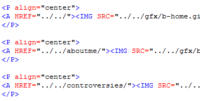Markup
From Just Solve the File Format Problem
(Difference between revisions)
Dan Tobias (Talk | contribs) |
Dan Tobias (Talk | contribs) |
||
| Line 25: | Line 25: | ||
See also [[Document]] and [[Text-based data]]. | See also [[Document]] and [[Text-based data]]. | ||
| + | |||
| + | == Links == | ||
| + | * [https://thoughtstreams.io/glyph/remember-the-nineties/ Remember the Nineties] (complaint about how markup languages are still in use instead of more user-friendly WYSIWYG stuff) | ||
Revision as of 02:31, 14 December 2013
Markup languages express the structure and/or presentation of a document through the use of tags, elements, and embedded commands and codes. They are distinguished from programming languages, because instead of giving instructions to be executed, markup elements designate the nature, purpose, or style of text and media which is part of a document.
- DTD (Document Type Definition); used to define document formats in markup languages
- HTML (HyperText Markup Language)
- LaTeX (User-friendly version of TeX used by mathematicians, computer scientists etc)
- Markdown
- Opus Embedded Commands (OEC)
- reStructuredText
- Scribe
- SGML (Standard Generalised Markup Format)
- TEI (Text Encoding Initiative; Specialised dialect of SGML)
- TeX (TeX type-setting language created by Donald Knuth)
- Wiki markup
- WML
- XHTML (Extensible HTML)
- XML
See also Document and Text-based data.
Links
- Remember the Nineties (complaint about how markup languages are still in use instead of more user-friendly WYSIWYG stuff)
